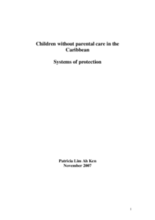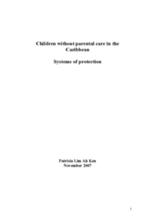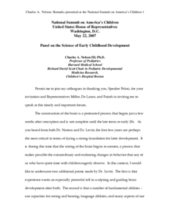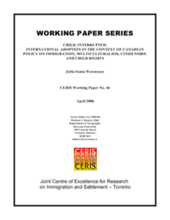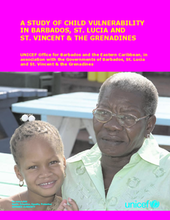This page contains documents and other resources related to children's care in the Americas. Browse resources by region, country, or category.
Displaying 1401 - 1410 of 1438
A report on common challenges facing children without parental care in the Caribbean (CARICOM region). It gives an in-depth understanding of why there is a lack of family-based preventative and rehabilitative services for children and provides recommendations.
A regional assessment of responses to children outside parental care in the Caribbean. Extensive research on successful examples of alternative care. Includes recommendations and lessons learned.
The transcript of a speech by Dr. Charles A. Nelson III for the United States House of Representatives. Focus on the basic science and fundamental importance of early childhood development. Advocates strongly for increased attention on the experiences and environments provided for young children.
This paper examines how international adoption fits within the legal and conceptual framework of Canadian policy and legislation and international treaties to which Canada is a party.
This article highlights findings from various studies of developed countries focusing specifically on foster-care outcomes.
This document provides a review of outcome research on family foster care services in Australia, Italy, United Kingdom, and United States of America. Further research directions to improve family foster care are suggested.
Reports on an evaluation of the monitoring system for children in the custody of the Jamaican government. Highlights problems and inefficiencies inherent in the monitoring process. Includes recommendations.
The report details the scale and nature of migritaion by children entering the United States. It includes policy analysis and recommendations around the protection of seperated and unaccompanied children.
Country-based analysis of child vulnerability in Barbados, St. Lucia, and St. Vincent & the Grenadines. Includes statistical and demographic data on vulnerable populations. Identifies specific barriers to meeting regional needs in child protection.
Documents a unique survey on the impact of AIDS on populations of disabled people. Particular emphasis on identifying disability-specific concerns.


